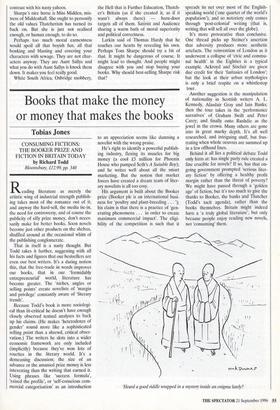Books that make the money or money that makes the
books
Tobias Jones
CONSUMING FICTIONS: THE BOOKER PRIZE AND FICTION IN BRITAIN TODAY by Richard Todd Bloomsbury, £12.99, pp. 340
Reading literature as merely the artistic wing of industrial strength publish- ing takes most of the romance out of it; and anyway the hard-sell, the media tie-in, the need for controversy, and of course the publicity of silly prize money, don't neces- sarily make for better books. Soon novels become just other products on the shelves, shuffled around at the occasional whim of the publishing conglomerate.
That in itself is a nasty thought. But Todd takes it further, suggesting with all his facts and figures that our bestsellers are even our best writers. It's a daring notion this, that the free-trade in words improves our books, that in our 'formidably entrepreneurial' world, literature has become greater. The 'niches, angles or selling points' create novelists of 'margin and privilege' constantly aware of 'literary trends'.
Because Todd's book is more sociologi- cal than lit-critical he doesn't have enough closely observed textual analyses to back up his claims. (He makes 'heterodoxes of gender' sound more like a sophisticated selling point than a shrewd, critical obser- vation.) The writers he slots into a wider economic framework are only included (implicitly) because they've won lots of rosettes in the literary world. It's a demeaning discussion; the size of an advance or the amassed prize money is less interesting than the writing that earned it. Using phrases like 'success formula', 'raised the profile', or 'self-conscious com- mercial categorisation' as an introduction to an appreciation seems like damning a novelist with the wrong praise.
He's right to identify a powerful publish- ing industry, flexing its muscles for big money (a cool £3 million for Phoenix House who pumped Seth's A Suitable Boy); and he writes well about all the smart marketing. But the notion that market forces have created a dream team of liter- ary novelists is all too cosy.
His argument is built about the Booker prize (Booker plc is an international busi- ness for 'poultry and plant-breeding '); his claim is that there is a practice of 'gen- erating phenomena ... in order to create maximum commercial impact'. The eligi- bility of the competition is such that it spreads its net over most of the English- speaking world ('one quarter of the world's population'), and so notoriety only comes through 'post-colonial' writing (that is, writing that will sell all over the globe).
It's more provocative than conclusive. One thread picks up Steiner's assertion that adversity produces more aesthetic artefacts. The reinvention of London as it underwent a collapse of 'civic and commu- nal health' in the Eighties is a typical example. Ackroyd and Sinclair are given due credit for their 'fantasies of London'; but the look at their urban mythologies is only a brief respite on a whistlestop tour.
Another suggestion is the manipulation of nationality in Scottish writers A. L. Kennedy, Alasdair Gray and Iain Banks; then the tour takes in the 'performance narratives' of Graham Swift and Peter Carey; and finally onto Rushdie as the jewel in the crown. Many others are gone into in great murky depth. It's all well researched, and intriguing stuff, but frus- trating when whole oeuvres are summed up in a few offhand lines.
Behind it all lies a political debate Todd only hints at: has single party rule created a fine crucible for novels? If so, has that on- going government prompted 'serious liter- ary fiction' by offering a healthy profit margin rather than the threat of poverty? We might have passed through a 'golden age' of fiction, but it's too much to give the thanks to Booker, the banks and Thatcher (Todd's tacit agenda), rather than the books themselves. Britain might indeed have a 'a truly global literature', but only because people enjoy reading new novels, not 'consuming' them.
'Heard a good riddle wrapped in a mystery inside an enigma lately?


















































































 Previous page
Previous page